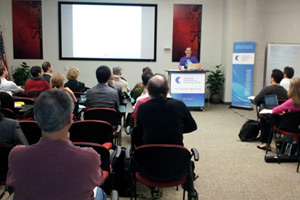TDLC All Hands Meeting 2013
BROADEST, BIGGEST EVER … It may well be that any event improves with practice, but it remains that TDLC's February 7-9, 2013 All Hands Meeting not only broke its own records for planning, organization and smooth running, but also for an enhanced Trainee program plus quantity of intriguing research presentations and questions. As always, Roger Bingham and crew videotaped the proceedings for online viewing on The Science Network (TSN) http://thesciencenetwork.org/. And this time around the annual get-together included content for not only scientists but teachers: Twenty-five or more of the San Diego contingent of Doris Alvarez's Educators Network plus a few of the 21 members of the newly-formed Colorado Branch of TEN, with host PI TDLC's Mike Mozer. As Paula Tallal (TDLC Executive Committee member and Rutgers University Neuroscience Professor) commented, "It is really interesting to see how far we have come over the years of TDLC funding, in better understanding of nesting time scales and how this is contributing to better inform our understanding of the role of time and timing in learning. Being able to focus so centrally on scientific integration was excellent and really set the stage as we consider the most important research to do in the last three years of TDLC's NSF funding."
"Life passes in milliseconds but what we learn in those milliseconds changes us for life." As the lead-off Keynoter, Mark Churchland (Columbia University Assistant Neuroscience Professor and 2012 recipient of a New Innovator Award from NIH) waded into details and slides on what is known and remains to be discovered about the neural dynamics of movement generation. Next, Dave Peterson (former SMN Trainee now a Post-doctoral Fellow at Salk Institute) turned to an exploration of dystonia, a complicated condition of motor learning gone awry. He was followed by big, bluff Bernie Till (University of Victoria and a TDLC Trainee) who expounded on studying cognition by measuring movements. And rounding things out Emo Todorov (TDLC PI and University of Washington Associate Professor) moderated a structured discussion featuring the previous speakers on integrating models and the experimental study of movement. So it was a morning of immense information, especially for anyone not steeped in the subjects. Still, most enjoyed the brain workout, and the lunch that followed was tasty and somewhat leisurely. The afternoon breakout sessions included Initiative Groups under Paula Tallal (Co-coordinator of Initiative 1 --Temporal Dynamics of the World); Andrea Chiba (TDLC Science Director, UCSD Cognitive Science Professor and Co-coordinator of Initiative 2 (Temporal Dynamics of the Brain) and Isabel Gauthier (Vanderbilt PI and TDLC Executive Committee and also Co-coordinator of Initiative 2). Speaker John Herrington (Children's Hospital of Philadelphia and former TDLC Trainee) delved into the temporal dynamics of the impact of emotion on learning, and Tim Brown (UCSD Assistant Research Scientist and TDLC network member) elaborated on MEG (magneto-encephalography) studies of the temporal dynamics of cortical auditory processing. To end the day, the annual Poster Session was well organized, thanks to Kimberly Kruse and crew, with many entries standing out, and the accompanying hors d'oeuvres delectable.
Next came breakout sessions including Initiative 3 (Temporal Dynamics of Movement and Exploration) with Virginia de Sa (SMN member and UCSD PI) as well as -- expressly for teachers in attendance -- David Daniel (Psychology Professor at James Madison University) with an engaging presentation: "Translating Mind Brain Education to the Classroom and Back." Tom Fehrenbacher (High Tech High, San Diego) was enthusiastic, "David Daniel's talk was insightful, wide ranging, full of suggestions and humorous." And Jacqueline Hike (Hope International University, Fullerton) went further: "Interest in the brain is a hot topic in educational circles … it has been difficult, however, to separate the wheat from the chaff … this session was particularly relevant to us as educators … David Daniel provided some great encouragement … we can be action researchers and document our interventions and strategies in our classrooms while reflecting more on our practice …this in turn would provide even greater opportunities to pose research questions for investigation … related to our real-life class situations as we continue this wonderful relationship and interaction afforded us through TDLC." In a later breakout session, Terry Sejnowski led a rousing conversation, summed up in a big question: "(Are we able) to discover enough about the workings of the human brain with regard to learning to enable teachers to employ new ways into their scientifically-based classrooms and seriously impact public education?" Eva Pastalkova (Janelia Farms Scientist in the Howard Hughes Medical Institute and former TDLC IMS Trainee) brought the audience back to the inner workings of the brain in episodic memory, her rapid-fire delivery doubtless matching the neurons she speaks about. The talk by Lisa Scott (Assistant Professor, Psychology, U Mass Amherst and former PEN Trainee) on learning in infants was enlightening, especially about visual race bias beginning by 9 months of age. Final Keynoter Bruce McCandliss (Professor of Psychology and Human Development, Vanderbilt University and TDLC Advisory Committee member) offered some eye-opening statistics on urban literacy – or lack thereof – and said that:
The closing Panel wrestled with thoughts on "How to Get More Education Out of Our Science," and the festivities ended with the traditional Brainstorming Session and Dinner at Gary Cottrell's abode. |
